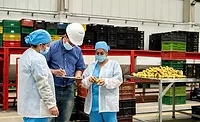Vienna Food Safety Forum 2025: The Potential of Digitalization

Image credit: Freepik
Turbulence in global food markets since 2020, including various supply chain disruptions, have affected our food systems. Under-investment in food safety systems have impacted the global food security and nutrition situation, leading to increased foodborne disease and human and socio-economic development challenges.
Food Safety Systems in Transition
At present, food safety systems face many hurdles. They face a lack of human and financial resources, which are necessary to challenge and further develop rule-based and scientific evidence-based systems. Alongside this, some major jurisdictions have further cut their public spending on food safety enforcement over the past 15 years, and many low- and middle-income countries (LMICs) are still unable to allocate sufficient resources for robust food control systems. The lack of competent auditors and personnel required for food safety systems has further impacted activities and services linked to the production of food.
Against this backdrop, the Vienna Food Safety Forum 2025 provides a platform to showcase how new digital solutions efforts can improve food safety surveillance systems and quality assurance practices by deploying technological innovation and collaborative platforms.
Digitalization: A Catalyst for Advancing Food Safety Systems
As food trade becomes more complex and globalized, digitalization offers a pathway to more responsive, data-driven, and resilient food safety systems. Digitalization could improve food safety surveillance systems and quality assurance practices. New approaches deploying technological innovation, collaborative platforms, and food safety practices have already been discussed in global events like the Vienna Food Safety Forum 2022, and are being tested by the public and private sectors. These new approaches can offer solutions to meet international food safety standards and manage risk effectively.
The integration of digital technologies is rapidly becoming essential for the future of food safety. A number of countries are experimenting with AI-powered decision support tools, inspections, and digital dashboards that enhance transparency and responsiveness. These innovations can help streamline food safety governance, improve risk detection, and reduce regulatory burdens when implemented under the right conditions.
Digitalization is no longer a theoretical concept—it is increasingly shaping food safety practices in real time. Governments and institutions apply machine learning models to inspection planning, compliance monitoring, and certification processes. These tools could help improve efficiency, boost accountability, and enhance responsiveness in regulatory operations. As implementation spreads, stakeholders must navigate infrastructure, data governance, and cross-sector collaboration challenges.
Unlocking the Power of Data for Better Risk Management
Data-informed approaches have the potential to play a growing role in enhancing food safety management systems. To ensure that adequate guardrails are built around the use of data, it is crucial to raise stakeholders' awareness, support data readiness through digital standards, develop trusted solutions, and upskill personnel using these technologies.
Looking for quick answers on food safety topics?
Try Ask FSM, our new smart AI search tool.
Ask FSM →
Raising awareness of the potential roles of digitalization and AI will enable food safety stakeholders to better identify and prioritize food safety risks and improve resource allocation and response time. Working on data readiness will enhance the integrity and, ultimately, the trustworthiness of data, which can open new opportunities for predictive models. These models could help authorities anticipate foodborne illness outbreaks, while digital tools could facilitate the early detection of recurring hazards. However, widespread adoption requires progress in data standardization, improved data-sharing protocols, and investment in digitalization and data literacy across the food safety workforce.
Ensuring Traceability and Trust Through Digital Solutions
Digital traceability systems enhance food safety and build consumer trust. By enabling end-to-end tracking across complex supply chains, digital traceability supports more efficient recalls, reduces fraud, and improves regulatory compliance. Interoperability and harmonized data standards are key to unlocking these benefits; two successful examples are barcodes and blockchain.
Bridging the Data Gap Through Collaboration
During the Vienna Food Safety Forum 2022, stakeholders discussed the use of data generated by voluntary third-party assurance (vTPA) programs and the Codex guideline CXG 93-2021. At that time, it was highlighted that the success of food safety systems hinges on effective data-sharing among government agencies, industry actors, and international partners. While digital platforms facilitate more dynamic collaboration, fragmented technologies and inconsistent standards remain barriers. Agreement on digital pathways, legal frameworks, and communication protocols is critical to achieving meaningful progress.
Further dialogue is needed to advance collaboration opportunities between government and the private sector at a global level. Trust-building, clear legal agreements, and structured data formats can accelerate progress. Successful public–private collaboration examples highlight how digitalization can enhance regulatory outcomes while supporting innovation and competitiveness in the food industry.
Modernizing Oversight Through Remote Tools
Remote audit practices and electronic certification are gaining ground as cost-effective, scalable tools for regulatory oversight. The development of international electronic certification systems are improving food safety assurance and facilitating trade efficiency and transparency, particularly in cross-border contexts.
The Transformative Role of AI and Machine Learning
AI and machine learning are emerging as critical enablers of food safety transformation. From precision agriculture to automated risk evaluations, these technologies are being used to enhance surveillance and regulatory oversight. Case studies from various countries demonstrate AI's ability to reduce risks, improve decision-making, and facilitate trade. Still, challenges remain—particularly around data quality, model validation, ethical use, and the integration of human expertise into automated systems.
Shaping the Digital Future of Food Safety at VFSF 2025
The Vienna Food Safety Forum 2025 (VFSF 2025), taking place from June 10–12, 2025 in Vienna, Austria, will explore the dynamic trend of digital solutions under the theme "The Potential of Digitalization." Gathering experts from across the world, the forum will provide a platform for dialogue, learning, and partnership on the digital transformation of food safety. Discussions will address the opportunities and challenges of digitalization, spotlight real-world innovations, and identify pathways to build safer, more sustainable, and digitally empowered food systems worldwide. Register here!








